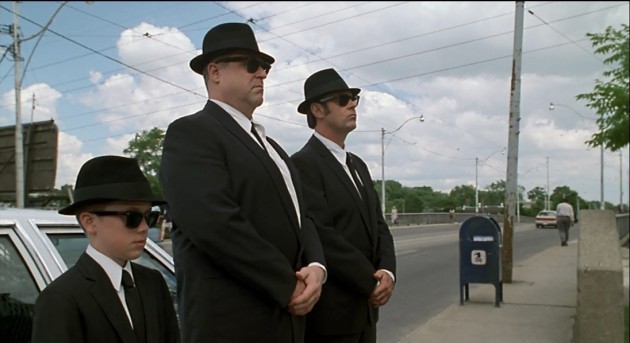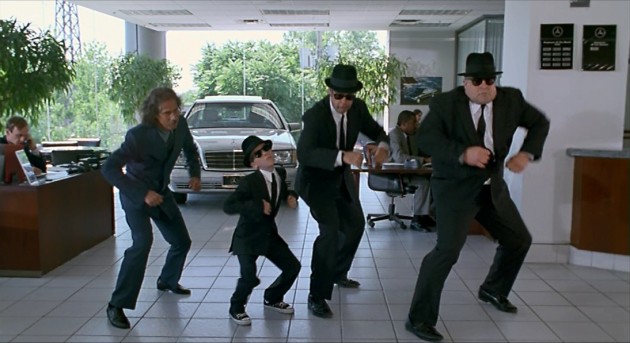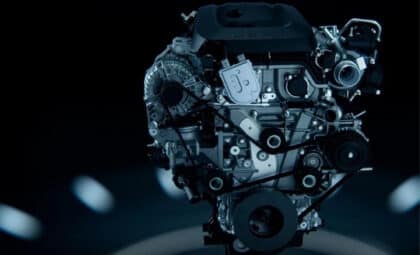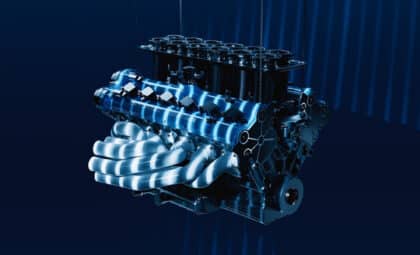Dan Aykroyd as Zombie Elwood Blues in Blues Brothers 2000, an unholy attempt at resurrecting a dead film property
It’s always a bit depressing to watch the inexorable march of time turn once-hip Saturday Night Live stars into paunchy movie dads. As the first host of Weekend Update, 1975-era Chevy Chase was the country’s preeminent young wiseass. But as his hairline and fame receded in the following years, he eventually found himself playing lame fathers in movies like the National Lampoon’s Vacation franchise, and he was last seen as a clueless, bigoted senior citizen on the show Community. Perennial SNL host Steve Martin also transitioned from a groundbreaking stand-up comic into a middle-aged patriarch in films like Parenthood and Cheaper by the Dozen (although his transformation was more subtle, considering he has always been silver-haired). And Martin’s fellow “wild and crazy guy,” Dan Aykroyd, gained some weight, lost some hair, and eventually found himself getting supporting roles as bumbling authority figures in movies like Sgt. Bilko and Evolution.
Of course, everybody gets older, and in the end you have to respect performers who learn to adapt in order to keep their careers alive. However, when a man of advancing years tries to pull off a character he played when he was still in his twenties – well, that’s when things get really sad.
Like this. This is really sad.
And that’s just one of the many big problems facing Blues Brothers 2000, a belated 1998 sequel to the 1980 classic, which finds a forty-six-year old Dan Aykroyd reprising his iconic role as Elwood Blues. The other big problem is that his original co-star, John Belushi, died of a drug overdose in 1982. And the third big problem is that this movie sucks.
The Plot
If I wanted to, I could probably cut-and-paste the plot summary from my Blues Brothers review and just change a few key words here – this film is practically a remake of the 1980 original, but with Illinois secessionists replacing Illinois Nazis, John Goodman replacing John Belushi, old Aretha Franklin replacing young Aretha Franklin, sadness replacing joy, etc.
Dan Aykroyd reprises his role as Elwood Blues, 18 years after the original
It starts with Elwood Blues (Dan Aykroyd) being released from jail 18 years after his imprisonment (yes, 18 years – despite the title, Blues Brothers 2000 actually takes place in 1998). He stands by the side of the road for over 24 hours and waits for Jake to come pick him up, until a prison employee (Frank Oz, reprising his cameo role from the original) comes out and breaks the news of Jake’s death to him.
So Elwood goes to see Mother Mary Stigmata, as in the first film, and she tells him that his surrogate father Curtis (Cab Calloway) has also died. And then, for no real reason, she also tells him that Curtis had an illegitimate son he never met named Cabel, who works as a commander for the Illinois State Police. Then (again, for no real reason) she asks Elwood to “mentor” a 10-year old child at the orphanage named Buster.
Elwood outrages Cabel when he tells him that his real father was Curtis and that they are really “brothers,” so Cabel throws him out. Then Buster steals Cabel’s wallet so that Elwood can (once again) buy a used police squad car. Then Elwood, despite having no interest in mentoring Buster, decides to take the kid with him as he hits the road on a mission to put the band back together (again). Once again, there is no real reason for Elwood to keep this useless brat around, other than the fact that it makes him guilty of kidnapping, which gives Cabel an excuse to lead a massive manhunt to find Elwood.
Commander Cabel “Cab” Chamberlain (Joe Morton) does not take kindly to Elwood’s news that he is an illegitimate child
Elwood’s quest to put the band back together begins with a stop at a strip club run by their former drummer, Willie Hall. It is there that he discovers bartender Mac McTeer (John Goodman) can sing (sort of), and gives him a suit and fedora so that he can become an honorary Blues Brother (it’s that easy, apparently). He also finds out that Willie is paying off the Russian mafia for protection, and after Elwood tries to send a message to two of their thugs, the mob starts chasing him, too.
Left to right: Buster Blues (J. Evan Bonifant), “Mighty” Mac McTeer (John Goodman), and Elwood Blues: the new, un-improved Blues Brothers
When Elwood goes to recruit guitarist Matt Murphy, the film hits its nadir: Murphy – who, in the original film, was working with his wife, Aretha Franklin, at a greasy soul food restaurant in Chicago – now co-owns a Mercedes-Benz dealership with her. While Franklin sings her signature song, “Respect,” Elwood and his new Blues Brothers Mac and Buster dance around luxury cars in one big, blatant advertisement for Mercedes. It would be more subtle if Aykroyd just walked up to the camera and, in his fake Chicago accent, deadpanned, “We did this one just for the money.”
Aretha Franklin wants you to “R-E-S-P-E-C-T” the exceptional quality and fine craftsmanship of these new Mercedes-Benz models
Eventually, the gang stops at a tent revival that is being led by Rev. Cleophus James (James Brown, reprising his role from the original). Commander Cabel “Cab” Chamberlain shows up to arrest the Blues Brothers, when suddenly he – like Jake Blues in the first film – “sees the light,” and realizes that being a Blues Brother is in his blood. Cab actually ascends towards the heavens and his police uniform morphs into a signature suit-and-fedora getup, thanks to the transformative power of the Holy Spirit/blues music.
Cab has the divine revelation that he is a Blues Brother
Cab joins the band on the lam as they head to southern Louisiana for a battle of the bands, now with a record four Blues Brothers – Elwood, “Mighty” Mac, Buster and Cab. Why does everybody get to be a Blues Brother this time around? In the first film, I don’t recall Jake and Elwood giving a pair of sunglasses to everyone who they spent more than thirty minutes with.
Finally they reach the battle of the bands, which is being held at the gothic mansion of voodoo sorceress Queen Moussette. This is where the movie gets sort of weird.
Paul Shaffer hams it up as Marco, Queen Moussette’s flamboyant butler. Moussette asks the band to play some Caribbean music. When Elwood explains that the band doesn’t play Caribbean music, she turns them into zombies. Much like the sight of the Blues Brothers dancing at a Mercedes-Benz dealership, the image of Elwood Blues as a stiff zombie sort of acts as an unintentional metaphor for this film.
Paul Schaffer as Marco/himself, servant to Queen Moussette (Erykah Badu)
Anyway, Moussette un-zombifies them so that they can perform in the battle of the bands, where they take on the Louisiana Gator Boys, a supergroup that features B.B. King, Eric Clapton, Bo Diddley, and about three million other famous musicians. Then the Russian mafia and some angry white power guys burst in to remind us that they’re still part of the plot, but Moussette quickly turns them into rats.
Yes, you read that right – she turns them into rats. With magic. The whole film feels tonally off in comparison to the original, and this is a good example of that. While The Blues Brothers had a cartoonish approach to its story (and the laws of physics) explained away by the fact that the boys were on a divine mission from God, Blues Brothers 2000 gets way too caught up in supernatural elements, with zombies and voodoo magic and other stuff that just doesn’t work. It’s like when Spielberg annoyed Indiana Jones fans by having his iconic archeologist come in contact with aliens instead of religious iconography in Kingdom of the Crystal Skull.
The Louisiana Gator Boys, featuring B.B. King, Eric Clapton, Bo Diddley, Isaac Hayes, Dr. John, and many more
After the Blues Brothers lose to the Louisiana Gator Boys, the police show up to arrest Elwood, so he and Buster sneak out of the venue together and hit the open road once more. Again, I’m not sure why this kid exists at all, unless Aykroyd and company were planning on even more sequels which “Buster Blues” might grow up to star in – but nevertheless, the two of them get a happy ending.
Vehicles Used
As in the original Blues Brothers, the Bluesmobile is a used cop car. This time it’s a 1991 Ford LTD Crown Victoria. The other band members, meanwhile, travel in a 1997 Mercedes-Benz S-Klasse, which is ruined when Elwood spray paints the words “BLUES BROTHERS BAND” along the side.
A 1991 Ford LTD Crown Victoria (left) parked next to a 1997 Mercedes-Benz S-Klasse (right)
The S-Klasse also makes an appearance during that ridiculous rendition of “Respect,” as the boys dance around various Mercedes models, including a 1998 Mercedes-Benz ML and a 1998 SLK 230 convertible.
The Blues Brothers, just casually busting some moves at a Mercedes-Benz dealership
As in the original, lots and lots of police cars get wrecked. This time they are mostly early-nineties Ford Crown Victorias, but there are also some Chevy Luminas, Chevy Caprices, and Ford Tauruses (literally) thrown in for good measure.
A whole mess of cars
Our Blues Brothers 2000 Review
There was one exciting revelation I had when watching this film — around the forty-minute mark, when the Blues Brothers disrupt a Russian mob funeral, one of the Russian baddies yells this:
Wait a minute, THIS is where Dan Aykroyd got the idea for his own premium liquor brand, Crystal Skull Vodka!!!
Aside from spotting that, the experience of watching this film was not a pleasant one. The main impression I got from this movie was that it was a cheap, quick, cynical attempt at cashing in on the Blues Brothers name.
However, when I read up on the production history of the film, I discovered that Dan Aykroyd lost 90 pounds in order to reprise his role as Elwood, which shows some impressive commitment (and keeps his middle-aged take on the role from being even more embarrassing). Also, he and Goodman both worked without a salary to keep the film’s budget down. So maybe this really was a labor of love for all involved, even if it comes across as the exact opposite.
And perhaps it wasn’t the filmmakers but Universal who got greedy – director John Landis reportedly dropped out of mainstream Hollywood filmmaking because of the studio meddling he dealt with on Blues Brothers 2000.
Either way, if this was just a shameless cash grab, then it was an unsuccessful one: the movie made back only half of its $28 million budget. A critical, commercial, and artistic failure, Blues Brothers 2000 should be held up as a prime example of why SNL stars should age gracefully rather than attempt to recapture their younger glory days.
Now, having said that… who else is pumped for National Lampoon’s Vacation VI and Ghostbusters 2015?!?!?
Patrick Grieve was born in Southwestern Ohio and has lived there all of his life, with the exception of a few years spent getting a Creative Writing degree in Southeastern Ohio. He loves to take road trips, sometimes to places as distant as Northeastern or even Northwestern Ohio. Patrick also enjoys old movies, shopping at thrift stores, going to ballgames, writing about those things, and watching Law & Order reruns. He just watches the original series, though, none of the spin-offs. And also only the ones they made before Jerry Orbach died. Season five was really the peak, in his opinion. See more articles by Patrick.






















